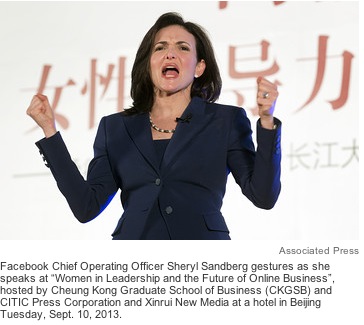 China may not play fair with Facebook, but at least it’s open to letting one of the social network’s top executives try to make things fairer for Chinese women.
China may not play fair with Facebook, but at least it’s open to letting one of the social network’s top executives try to make things fairer for Chinese women.
Facebook COO Sheryl Sandberg gave a speech in front of about 1000 people at the Cheung Kong Graduate School of Business in Beijing this week to promote the Chinese version of her book “Lean In: Women, Work, and the Will to Lead.”
Though Ms. Sandberg did her best to work into the speech points specific to China, at several times she acknowledged that China was different from the U.S. and that she couldn’t speak as directly to the circumstances in China. That has not stopped her book from doing well in China.
The book’s publisher attributes the strong sales in part to the allure of Facebook, which though blocked in China, enjoys influence and respect in the country due to its success.
“Big name companies and business advice are always two selling points for books in recent Chinese society” said Xu Yang, associate managing editor of CITIC Press. Mr. Xu also said the book also benefited from appealing to China’s businesswomen.
“Usually the mainstream readers of business-related books are men, but since Sandberg is a female leader, it’s been more attractive for women,” said Mr. Xu.
In part the reason for the book’s popularity might be the universality of the topics Ms. Sandberg is addressing: In China, as in the United States and Japan, women do more housework.
“If you want to make your wife happy, don’t buy flowers, do laundry,” she said, pointing out that in China women do twice the amount of housework that men do without citing a source.
At another speech at the World Economic Forum in Dalian China on Wednesday, Ms. Sandberg said that women’s roles in leadership –whether in China, the U.S. or elsewhere — have been stagnant in the last decade. Women are told they are too bossy when they exert themselves as leaders, while men are encouraged when they lead, Ms. Sandberg said.
“As women become more successful in their work, they are less liked,” she said, adding that the opposite is true for men.
Ms. Sandberg’s book arrives at a time when Chinese women appear to be giving up some of the advances made during the Mao era, when the Communist Party mandated impressive leaps in gender equality. A relatively high percentage of Chinese women participate in the workforce, particularly compared with other countries in Asia, but studies show men still overwhelmingly dominate senior roles in business and politics. China’s ranking in the World Economic Forum’s gender equality index fell to 69th last year from 57th in 2008.
Lack of female leadership has become an economic issue, said Ms. Sandberg. “If we don’t get women to participate in society, growth stalls,” she said. “We have no choice; We have to fix this.”
On Douban, a Chinese website that allows people to rate films, books and music, the book got four stars out of a possible five by 560 reviewers. One of the readers, Ms. Gu, wrote “I have read this book. This book told me that there are a lot of alternatives, never give up since you are a woman. Fight for it if you really want it. You can work until the day you have to give birth a baby, you can make effort than everybody does, you can lean in, you can sit on the table, and you can move on after you cry! And I will really do that.”
While the Chinese government blocked Facebook out of fear it could be used to organize social movements, Ms. Sandberg’s book itself is having a similar, if less widespread, effect with informal “Lean In” groups sprouting up in Chinese cities.
Zhang Xiaoxia, a 24-year-old business study consultant recently organized a reading party for “Lean In.” She said there were around thirty women at the party who shared their work experiences. “I found this book powerful, and after I read the book, I really decided to lean in and sit closer to my boss the next meeting!”
– Olivia Geng
http://blogs.wsj.com/chinarealtime/2013/09/13/chinese-women-lean-close-t…